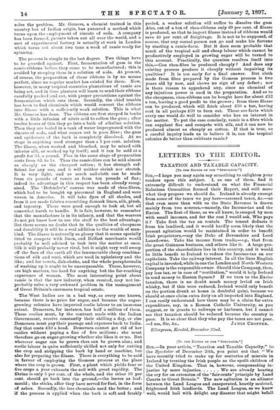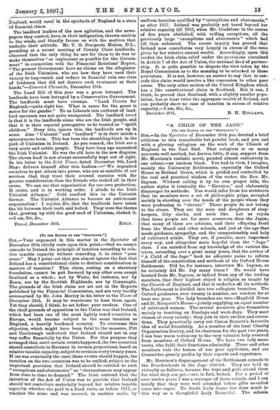LETTERS TO THE EDITOR.
TAXATION AND TAXA.BLE CAPACITY.
[To THE EDITOR OF THE " &MCP/TOR:1
hope you may again say something to enlighten your- readers upon this subject. I, as one of them, find it extremely difficult to understand on what the Financial Relations Committee formed their Report, and still more what they propose we should do. Ireland is already exempt from some of the taxes we pay hereŌĆöassessed taxes, &c.ŌĆöso that even more than with us the State Revenue is drawn mainly from two sources,ŌĆönamely, the Income-tax and the Excise. The first of these, as we all know, is escaped by men with small incomes, and for the rest I would ask, Who pays it ? Take first the tax on rentals. The tenant deducts it from his landlord, and it would hardly seem likely that the present agitation would be maintained in order to benefit: Irish proprietors,ŌĆösay the Duke of Devonshire and Lord. Lansdowne. Take the income from trade,ŌĆöe.g., that from the great Guinness business, and others like it. A large pro- portion of the shareholders live in this country, and it would. be little benefit to Ireland to reduce the Income-tax on our- capitalists. Take the railway interest. In all the lines English. capital is invested,while in one the London and North-Western, Company is the responsible owner. Should this Company, then,. pay less tax, or in case of "restitution," would it help Ireland to send money to Easton Square? If we turn to the Excise- taxation, there is no doubt much money levied on Irish whisky, but if this were reduced, Ireland would only benefit on the portion drunk at home (a doubtful gain), because we- should at once claim extra duty on all imported into England. I can easily understand how there may be a claim for extra expenditure, say, in a Roman Catholic University, as you suggest, or in grants to railways or harbours, but I cannot. see that taxation should be reduced because the country is. poor. It is so clear that they who pay the taxes are not poor..
ŌĆöI am, Sir, 8z.c., JAMES CROPPER.
Ellergreen, _Kendal, December 22nd.
[TO THE EDITOR OF THE "SPECTATOR."] Sin,ŌĆöIn your article, "Taxation and Taxable Capacity," in, the Spectator of December 26th, you point out that "We have recently tried to make *up for centuries of misrule in Ireland by treating the Irish people as the spoilt children of the United Kingdom. That is, however, compensating in-
justice by more injustice We are already hearing the cry for an extension of the fair-rents' principle by Land' Courts to Great Britain." The new agitation is an alliance between the Land League and exasperated, heavily mulcted. frightened Irish landlords. The Land League, as we know. well, would hail with delight any disaster that might befall England, would revel in the spectacle of England in a state of financial chaos.
The landlord leaders of the new agitation, and the news- papers they control, have, in their indignation, thrown caution to the winds, and blandly favour us with the motives that underlie their attitude. Mr. T. G. Stacpoole Mahon, D.L., presiding at a recent meeting of County Clare landlords, observed that the only thing he saw for them to do was to make themselves "as unpleasant as possible for the Govern- ment" in connection with the Financial Relations' Report. -" The present Government have no claims on the allegiance of the Irish Unionists, who see how they have used their victory to impoverish and reduce to financial ruin one class of Irishmen that did not deserve such treatment at their hands."ŌĆöLimerick Chronicle, December 15th.
The Land Bill of this year was a gross betrayal. The landlords have been betrayed by a Conservative Government. The landlords must have revenge. "Land Courts for England,ŌĆöquite right too. What is sauce for the goose is sauce for the gander." To us Liberals this outburst of land- lord unreason was not quite unexpected. The landlord creed cis that it is the landlords alone who are the Irish people, and that it is their especial prerogative to be treated as "spoilt children." Deny this, ignore this, the landlords are up in arms. Also " Unionist " and "landlord" is in their minds a synonymous term. This has been the stumbling-block in the path of Unionism in Ireland. As you remark, the Irish are a very acute and subtle people. They have long ago unmasked the Irish Unionist. He was the old hate in the new disguise. The cloven hoof is not always successfully kept out of sight. In his letter to the Irish Times, dated December 8th, Lord Mayo delivers himself after this fashion :ŌĆö" We organised ourselves to put others into power, who are so sensible of our services that they treat their avowed enemies with far greater consideration than the friends who staked all in their cause. We can use that organisation for our own protection. It exists, and is in working order. I allude to the Irish Unionist Alliance." Cold comfort this to the Unionist farmer. The Unionist Alliance to become an anti-tenant organisation! I rejoice, Sir, that the landlords have taken the bit between their teeth and bolted. They were the thorns that, growing up with the good seed of Unionism, choked it. ŌĆöI am, Sir, &c., Tervol, December 28th. MILT.
[TO TIM EDITOR Or THE "SPECTATOR."]
SIR,ŌĆöYour argument in this matter in the Spectator of December 26th chiefly rests upon this point, ŌĆöthat we cannot concede to Ireland the principle of taxation according to rela- tive taxable capacity without conceding it to other "poor -areas." May I point out that you almost ignore the fact that Ireland has a, constitutional claim to distinct consideration in matters of taxation ? This claim, resting on a statutory foundation, cannot be put forward by any other area except Scotland as a whole ; not by Wales, for instance, nor by Essex, nor by the Scottish Highlands, nor by Connaught. The grounds of the Irish claim are set out in the Reports published by the Financial Commission, and are very lucidly 'summarised by Mr. John Morley in his letter to the Times of December 24th. It may be wearisome to hear them again. Yet they should, I think, be set before your readers. One of the chief grounds of opposition to the Union was that Ireland, which had been one of the most lightly taxed countries in Europe, would become subject to the same taxation as England, a heavily burdened country. To overcome this objection, which might have been fatal to the measure, Pitt and Castlereagh undertook that Ireland should not in any way suffer financially by the Union. For this purpose they arranged that, until certain events happened, the two countries should contribute to Revenue in certain proportions, based on relative taxable capacity, subject to revision every twenty years. If (as was eventually the case) these events should happen, the taxation on the two countries was to be unified, subject to the important provision that Ireland should be entitled to such "exemptions and abatements" as "circumstances may appear from time to time to demand." The Irish contend that the intention of the Act of Union was to provide that Ireland should not contribute materially beyond her relative taxable capacity, whether she paid in a fixed ratio, as before 1817, or whether the same end was secured, in another mode, by uniform taxation qualified by "exemptions and abatements," as after 1817. Ireland was probably not taxed beyond her relative capacity till 1853, when Mr. Gladstone in the course of five years abolished; with trifling exceptions, all the previously large "exemptions and abatements" which had till then subsisted. The recent inquiry has proved that Ireland now contributes very largely in excess of the ratio given by her relative annual wealth. Accordingly, upon this verdict the Irish claim relief under the provisions contained in Article 7 of the Act of Union, the national deed of partner- ship. It is quite possible to dispute the view taken by the Royal Commission as to the meaning to be attached to those provisions. It is not, however, an answer to say that to con- cede this claim would involve a like concession to other poor areas. The only other section of the United Kingdom which has a like constitutional claim is Scotland. But it can, I think, be proved that Scotland, with a slightly smaller popu, lation, has at least twice the aggregate wealth of Ireland, and can probably show no case of taxation in excess of relative capacity.ŌĆöI am, Sir, &c.,
December 27th. B. H. HOLLAND.















































 Previous page
Previous page